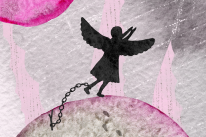
“You can’t stop the waves, but you can learn to surf.” ~Jon Kabat Zinn
In December of 2020, we noticed Mom’s speech seemed difficult. Like she had stuffed cotton balls in her mouth, and someone was restraining her jaw from moving. We asked her about it, she said it was nothing.
We hadn’t seen each other since we got together over the holidays. On New Year’s Day 2020, we clinked glasses filled with sparkling wine and shared bold predictions about how this was going to be our best year yet (spoiler alert, it wasn’t).
With every passing week and conversation, it got worse. We brought it up many times, my sister and I. We pleaded with her to see a doctor. We were separated by thousands of miles and a closed border. My sister in Virginia, me in California, Mom in Canada.
She said no, it wasn’t a big deal, it was getting better (spoiler alert again, it also wasn’t). She insisted she was fine. She could eat, drink, work, and speak. It was all good. She repeated this message as our worries grew. We felt powerless to help, especially in the face of her denial and refusal to get care.
In March of 2021, I got an odd message on Facebook messenger. It was from a woman who said she worked with my mother, asking me to call her. She had taken my mother to the hospital the night before, where she was admitted for extreme dehydration and exhaustion.
Her symptoms made no sense to them either, so she endured a battery of tests. Ultimately, it was revealed that what ailed her was amyotrophic lateral sclerosis, also known as ALS or Lou Gehrig’s disease. A horrible progressive nervous system disease that causes loss of muscle control. It is always fatal, with no known cure.
Her disease first attacked her ability to speak and swallow, an unusual first set of symptoms. When she was hospitalized, she finally admitted she hadn’t eaten a real meal in thirty days and had been able to drink less and less.
My sister and I are both career women with young families. I work for a tech company. The work is fast moving, complex, and nuanced. I used to pride myself on my “meeting endurance.” I often tackled days with ten to fourteen meetings, with enough energy left to crank out work deliverables, do an intense workout, and spend time with my six-year-old twins.
With my mother’s diagnosis and the new responsibilities of caregiving during a pandemic, I had to revisit many of my previous beliefs and assumptions. Here’s what I learned. I hope it helps you too.
Lesson 1: Out with stretch goals, in with baseline goals.
I’m a (sometimes) recovering overachiever. I have a history of establishing huge stretch goals and basking in satisfaction when I smash them. For years I was motivated by the striving to do more, be better.
Until I wasn’t.
With my mother’s diagnosis and the challenges of parenting and working in a pandemic, overwhelm swallowed me whole. It felt like I was surrounded by fuzzy darkness. Like I was moving through molasses.
I wasn’t alone, of course; mental health issues skyrocketed globally. Rates of depression and anxiety are rising. The term “languishing” was introduced to express the lack of thriving many more experienced.
I had to rethink my relationship to accomplishment.
I have given myself a break from stretch goals. I now set what I call baseline goals. Baseline goals are super small, completely achievable objectives. They are daily or weekly practices that have compounding impact when practiced consistently over years. Simply put, baseline goals are the smallest possible thing you can commit to that will support your well-being.
Instead of an overwhelming big picture, you create a concrete short-term focus.
Instead of a lengthy, high-intensity fitness routine or a stretch goal (let’s train for a marathon!), the baseline goal is fifteen minutes or more of movement six days a week. Walking counts. Slow yoga counts. Dancing in the living room definitely counts. I can do fifteen minutes.
Instead of kicking off a complex transformation project (let’s reinvent how we interact with our customers!), the baseline goal is each morning to determine the biggest priority for the day, and the absolute minimum action that needs to be taken. Then do that thing first. I can figure out one priority. I can do one thing.
It turns out that when you’re super clear on your minimums, it frees up a lot of the capacity used up by trying to do it all. It releases the guilt from impossibly high standards.
Lesson 2: Separate your future problems from your current problems.
It has become almost a mantra for me to say, “That’s not a problem I need to solve today.” There are SO. MANY. PROBLEMS. So many decisions to make.
I had to learn to be discerning about which problems I needed to tackle now and acknowledge that there were many I didn’t have enough information to figure out, so it made no difference to think about them.
When my sister and I moved my mother into an assisted living community, our minds were invaded by the “what ifs,” and “what will we do when?”.
“What if she needs more care than they can give?”, “What if we can’t support the costs?”, “What if we need to move her again?”, “What if they close the borders?”, “What if they disallow visitors?”.
We started asking ourselves, “What problems do we need to solve right now?”.
The only problem we needed to solve was immediate care and needs. We didn’t need to know the future. We could respond to new needs as they emerged.
It’s clearly not a healthy long-term behavior to ignore the future, but in crisis, clarifying where action and decisions are needed has been helpful in deescalating anxiety.
Lesson 3: Self-compassion is the new black.
There are many days when I feel like I’m failing in every dimension. No matter where I am or what I’m doing, I am racked with guilt and self-criticism because I’m not somewhere else, doing more.
Self-compassion is when we give ourselves the same kindness we’d extend to a good friend. When the guilt comes (and I haven’t yet figured out how to keep it at bay), and the self-critical talk starts, I pretend I’m talking to a dear friend. I’m doing my best. That’s all I can do.
Lesson 4: Embrace the suck.
It’s easy to become overwhelmed. To let my thoughts spiral into fear, worrying about the future in anticipation of what’s to come. I’ve now come to realize that when I do this, I am borrowing problems from the future. I am suffering in anticipation of things that may or may not come to pass.
All I have to do is be here, now. That’s all. I don’t need to live the future yet; I just need to live the present.
Jon Kabat-Zinn said, “Give yourself permission to allow this moment to be exactly as it is, and allow yourself to be exactly as you are.”
And right now, there are many moments that are difficult and painful. And I am often sad, depleted, and upset. That’s okay.
I can’t skip the hard parts; I have to experience them. And only by experiencing the most excruciating parts can I also fully experience the joyful moments.
You only ever have to deal with the moment you’re in right now. We can do hard things.
About Stephanie Greenoak
Stephanie is a recent Silicon Valley transplant to the Colorado mountains. As a tech leader, mom of twins, and caregiver, she finds refuge in writing. Get her free Mindfulness & Self-Acceptance in Crisis Guide, a companion to this article to support anyone going through hardship. Stephanie is a regular contributor to Mindfulness Incubator, a resource for overwhelmed professionals to live with more intention. Sign up to get awesome tools & resources delivered to your inbox, or find them on Instagram.













 Though I run this site, it is not mine. It's ours. It's not about me. It's about us. Your stories and your wisdom are just as meaningful as mine.
Though I run this site, it is not mine. It's ours. It's not about me. It's about us. Your stories and your wisdom are just as meaningful as mine.
“That’s not a problem I need to solve today.”
What an amazing mantra! Thank you for these precious words!
As someone living on a different continent than my parents, I keep having those ‘What ifs’ and ‘What will I do when’s’. Thank you for this mantra. It really keeps me from ‘borrowing problems from the future’, as you so aptly put it.
I loved your post! I’ve bookmarked it; I’m sure I’ll come back to these lessons and insights often.
Thank you. I needed this.
As someone going through a super tough time after yet another super tough time, it’s hard to practise compassion for myself especially. I also am a very tenacious, go getter- make everything happen yesterday, type person but it seems like now I’ve been forced to slow down (spoiler: I don’t like it). I went from working 4-5 12 hour days, working 3 jobs plus owning a small Etsy company to now going to school in a new town, knowing 3 people (maybe), and not working. It’s a huge adjustment and that need for control is taking over and causing so much anxiety. It’s hard to let things be especially when you’re a person who is so used to always seeing large results and fast. I often feel like I’m wasting time
I relate so much to this. My father’s health crisis this past year taught me many of these same lessons. A tip for keeping the guilt at bay, as you mentioned (I deal with this so much as well): EFT Tapping, an amazing, simple to learn form of energy healing. It has opened up so many healing miracles for me in my life. And during this crisis because I’m studying to be certified, I’ve been tapping every day for a year, and it has saved me many times over.